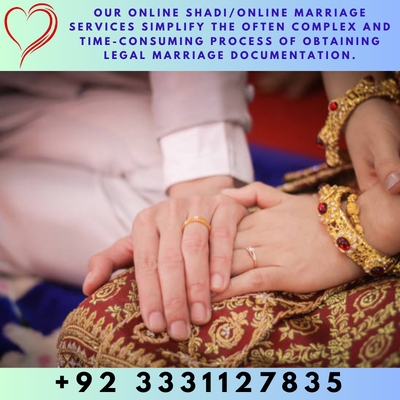Online Nikah In Islam: Understanding The Islamic Way
Marriage/Nikah is a vital bond that brings two individuals together, united in love and devotion. In Pakistan, this union is celebrated through the age-old tradition. Nikah Nama’s document holds deep religious significance and is a legal statement of the couple’s commitment. From its humble beginnings as a ritualistic practice to its evolution into a binding legal agreement, the Nikah Nama has played an integral role in shaping matrimonial customs in Pakistan
Nikah Nama: Exploring the Religious Significance
Nikah Nama: An Islamic Covenant
The Nikah Nama, a cornerstone of Islamic marriage, carries profound religious significance in the lives of Muslims. Rooted in the teachings of the Quran and the Hadith, it represents more than a legal contract; it signifies a sacred covenant between a man and a woman. The document serves as a tangible expression of their commitment to each other and to the tenets of Islam, highlighting the spiritual depth of the marital union.
Recent Post
Dont Hesitate To Contact Us
Location: Karachi – Islamabad – Rawalpindi – Lahore Pakistan
Compliance with Islamic Law
The Nikah Nama is a manifestation of adherence to Islamic law (Sharia). It formalizes the marriage according to Islamic principles, ensuring that the union is recognized in the eyes of God. This compliance with religious law is essential for devout Muslims, as it validates their relationship and allows them to fulfill their religious duties and obligations within the bounds of a lawful marriage.
Nikah Nama: Consent and Agreement
At the core of the Nikah Nama’s religious significance is the concept of consent. Both the bride and groom voluntarily consent to the marriage, echoing the Quranic injunction that there is no compulsion in religion (Quran 2:256). This emphasis on mutual agreement underscores the importance of free will in Islamic matrimony and reinforces the idea that marriage should be a choice made with complete understanding and willingness.

Nikah Nama: Guidance for a Righteous Life
The Nikah Nama contains clauses that outline the rights and responsibilities of both spouses in accordance with Islamic teachings. It serves as a guide for leading a righteous and harmonious married life. By adhering to these principles, couples are encouraged to foster love, respect, and compassion within their marriage, aligning their relationship with the values upheld by the Prophet Muhammad (peace be upon him).
Nikah Nama: A Lifelong Commitment
Through the Nikah Nama, couples make a solemn promise not only to each other but also to God. They pledge to support and care for one another, to live a life of faith, and to navigate the challenges of life as partners in righteousness. This religious commitment is a source of strength and solace, reminding couples of their spiritual bond and the higher purpose of their union.
Nikah Nama: Community Witness and Blessings
The religious significance of the Nikah Nama extends beyond the couple. It is a communal event witnessed by family and friends, who offer their blessings and support. In this sense, the Nikah Nama reinforces the idea that marriage is not only a private matter but a shared commitment celebrated within the wider Muslim community, fostering a sense of unity and solidarity among believers.
Under the Muslim Family Law Ordinance of 1961:marriages conducted under Muslim Law
The Muslim Family Laws Ordinance (MFLO) of 1961 holds authority over marriages conducted under Muslim Law in Pakistan. Irrespective of any conflicting laws, traditions, or customs, the MFLO is the primary governing framework, mandating the registration of marriages performed under Muslim Law under its stipulations. Muslim marriages, being contractual, require documentation through a standardized document known as the Nikah Nama. Notably, the MFLO doesn’t offer a specific definition of marriage; instead, Muslim jurisprudence outlines the criteria for a valid Muslim marriage and its essential prerequisites.

Components of the Nikah Nama
The Nikah Nama, the sacred Islamic marriage contract, consists of various components that outline the rights and responsibilities of both spouses. These include details about the bride and groom, witnesses, mahr (dowry), terms of divorce, and more. Each section plays a crucial role in solidifying the union between two individuals.
An In-Depth Look at Key Sections of Nikah Nama
Regarding the Nikah Nama, several key sections hold great importance. These include details about
- The groom and bride
- Witnesses
- Mehr(Dowry)
- Conditions of Marriage
- Divorce Clauses
Each section plays a vital role in ensuring the legality and validity of the marriage contract.
Importance of Specific Clauses
Specific clauses in the Nikah Nama hold immense importance. They outline crucial aspects such as dowry, maintenance, and divorce rights. These clauses ensure clarity and fairness in marital matters, protecting both parties’ rights and providing a legal framework for resolving potential disputes.
Legal Requirements and Processes
Registering Your Nikah in Pakistan
Registering your Nikah in Pakistan is crucial to formalizing your marriage legally. It involves submitting the necessary documentation and fulfilling the required formalities. Don’t forget to consult with local authorities or legal experts for guidance throughout the process!
Nikah Nama: Documentation and Formalities
Registering your Nikah is a crucial step in ensuring its legal validity. The documentation and formalities may vary depending on your location, but it generally involves submitting the required paperwork to the appropriate authorities. Remember to follow all necessary procedures diligently for a smooth and hassle-free process.
online Nikah In Islam: Overcoming Geographical Barriers
The beauty of online Nikah is that it transcends geographical barriers, allowing couples from different parts of the world to come together in marriage. Distance becomes irrelevant through virtual platforms and communication tools, as love knows no bounds. This modern approach to Nikah opens up a whole new realm of possibilities for Muslims seeking companionship, regardless of where they may be.
Challenges and Concerns In Online Nikah
Challenges and Concerns In Online Nikah: Navigating the Intersection of Tradition and Technology. While online nikah offers convenience, there are concerns about maintaining authenticity and validity. Striking a balance between tradition and technology is crucial for ensuring the sanctity of this sacred bond in Islam.
Balancing Tradition with Technology
As technology continues shaping our lives, Muslims must navigate the evolving landscape of online nikah while maintaining a solid connection to tradition. Finding harmony between these two worlds can be a delicate dance, but it is essential in ensuring that the sacred institution of marriage remains respected and upheld in Islam.
Ensuring Authenticity and Validity
Regarding online Nikah in Islam, ensuring authenticity and validity is paramount. From verifying the identities of both parties involved to ensuring that all necessary Islamic rituals are followed, maintaining the sanctity of this sacred bond remains a top priority.
Real Stories and Testimonials
Real Stories and Testimonials: Couples Share Their Experiences with Online Nikah in Islam
Discover the heartfelt stories and testimonials of couples who have embraced online nikah. From finding love across borders to overcoming obstacles, these real-life accounts showcase the power of technology in fostering meaningful connections rooted in Islamic values.
Couples Share Their Experiences with Online Nikah in Islam
Couples who have experienced online nikah in Islam share their heartfelt stories, recounting the joy and blessings they found in this modern approach to marriage. From seeing their soulmates across continents to embracing convenience without compromising on faith, these love stories are a testament to the power of technology in bringing people together.

The Role of Islamic Scholars and Authorities
Islamic Scholars and Authorities are crucial in guiding individuals seeking online Nikah. Their expertise ensures adherence to Islamic principles, validating the authenticity and validity of the marriage contract. Their guidance provides peace of mind for those embarking on this modern approach to finding their life partners.
Guidance and Fatwas on Online Nikah
Islamic scholars have provided valuable guidance and fatwas regarding online nikah. They emphasize the importance of following traditional Islamic principles, ensuring that the process adheres to the sacredness of marriage in Islam. Seek religious approval to provide a valid and authentic online nikah experience.
Seeking Religious Approval In Online Nikah
Regarding online Nikah in Islam, seeking religious approval is crucial. Before proceeding with an online nikah ceremony, it is essential to consult with knowledgeable Islamic scholars and authorities for guidance and clarification on the validity of such practices within the framework of Islamic teachings. This ensures that the Nikah is conducted under religious principles and maintains its sanctity.
The Future of Online Nikah in Islam
Online Nikah In Islam: As technology advances, the future of online Nikah in Islam looks promising. With more platforms emerging and evolving, it is likely that virtual matrimonial services will become even more accessible and convenient for Muslim individuals looking for marriage. The potential for growth and innovation in this field is exciting, opening up new possibilities for connecting couples across geographical boundaries and adapting to the changing needs of the Muslim community.
Adapting to Changing Times In Online Nikah
Adapting to changing times is essential for any tradition to thrive. In the context of online Nikah in Islam, it means embracing technology while staying true to Islamic principles. This evolution allows more people to find love and companionship while maintaining religious values. It’s a testament to the resilience and adaptability of Islam in the modern world.
Potential Trends in Islamic Matrimonial Services
As technology continues to advance and shape our world, it is inevitable that the concept of online nikah will continue to evolve. The convenience and accessibility offered by digital platforms have significantly impacted how Muslims approach marriage. But what does the future hold for online nikah in Islam?
One potential trend is integrating artificial intelligence (AI) and machine learning algorithms into matrimonial services. These technologies could help individuals find compatible partners based on their preferences, values, and compatibility factors defined by Islamic teachings.
Additionally, with the rise of virtual reality (VR) and augmented reality (AR), couples can participate in immersive pre-marital counseling sessions or even attend virtual wedding ceremonies from the comfort of their homes.
Another possible development is the establishment of standardized guidelines or accreditation systems for online nikah platforms. This would ensure that these platforms adhere to Islamic principles, maintain authenticity, and provide reliable services for those seeking a halal way to enter into marriage.
Furthermore, as more countries recognize online marriages legally, there may be increased acceptance and recognition of online nikah within legal frameworks worldwide. This would offer more excellent protection and rights for couples who choose this path.
However, along with these exciting prospects come challenges that need careful consideration. Balancing tradition with technology remains crucial to preserve the sanctity of marriage in line with Islamic teachings. Striking a balance between embracing technological advancements while upholding religious rituals must always be at the forefront.
It’s also essential to address concerns about authenticity and validity when conducting an online nikah. Platform providers should implement robust verification processes to ensure that all parties involved are genuine individuals seeking a legitimate union according to Islamic principles.
As time passes, it will become increasingly crucial for Islamic scholars and authorities to guide navigating this evolving landscape while maintaining adherence to core religious values.
